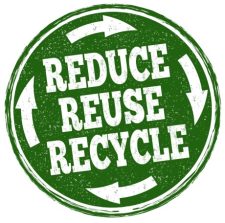 On this page:
On this page:
- Unnecessary Mail
- Party Supplies
- Reusable Cups and Bulk Drinks
- House Cleaning
- Gas Efficiency
- Local Produce
Unnecessary Mail
- Reduce the catalogues you receive by following the steps at CatalogChoice.org. In addition, inside of each catalogue, usually on the order page, there is a phone number or address with instructions for removing your name from their mailing list. Joining a general “Do Not Mail” list is insufficient; it will not stop catalogues from vendors with whom you have ever done business.
- Receive bills and statements electronically. Utilities, banks and insurance companies provide this option, because it saves them money. Check your paper statements for instructions on converting to electronic bill receipt and payment, or go to each vendor’s web site.
- Put unwanted mail in recycling. If you’re concerned about privacy, shred mail first. These paper products are recyclable: newspapers and inserts, corrugated cardboard, cereal and other boxes, telephone books, computer and office paper, paperback and hardcover books, magazines, catalogs, shredded paper, envelopes and boxes with plastic windows, and all other clean and dry paper.
Party Supplies
Wrap gifts in reusable bags.
- Create recyclable wrapping paper. Use 100% recyclable Kraft paper and rubber stamps. Decorate packages with reusable cloth ribbons. Metallic foil paper is not recyclable.
- Minimize use of paper plates, cups, and napkins. Avoid use of disposable plastic utensils that cannot be recycled. Rent or borrow tableware for large gatherings. Choose compostable products if you must use single-use items.
- Avoid single-serving and individually wrapped products. Buy drinks in recyclable containers instead of juice boxes. Buy food in the largest containers practicable and send home excess with guests, in reusable containers, or donate to food kitchen. Make sure the food kitchen accepts home-cooked food, or it will go in the trash.
Reusable Cups and Bulk Drinks
- Use your own cup when you buy coffee or tea. Many coffee shops and convenience stores (e.g., 7-11) will fill any size cup for less than you would pay if you use their cup. Often the biggest cost associated with your drink is the disposable cup.
- Offer bulk drinks at events. Reduce waste at picnics and community events by serving drinks that come in bulk, not single cans, bottles or boxes, and asking participants to bring their own reusable cups.
House Cleaning
- Use rags. Flannel rags work as well as disposable dust wipes for dusting. Lint-free rags are great for cleaning glass. Tough rags work better on countertops, bathroom surfaces and even floors than paper products. Attach a cloth rag to the pole extender meant for disposable wipes for convenience without waste. When germs are a concern, wash rags in hot water.
- Hide the paper towels. Store paper towels out of sight so they are not the first choice for clean-up jobs.
- Tub and sink cleaner. Sprinkle baking soda on the porcelain fixtures and rub with wet rag. Add a little liquid soap to the rag for more cleaning power. Rinse well to avoid leaving a hazy film.
- Window and mirror cleaner. Put 1/4 cup of white vinegar in a spray bottle and fill with water. Spray the surface & rub with lint-free rag. For outdoor windows, use a sponge and wash with warm water with a few drops of liquid soap in it. Rinse well and squeegee dry.
- Linoleum floor cleaner. Mop with a mixture of 1/2 cup vinegar in a pail of warm water. Vinegar odor dissipates shortly after surface dries.
- Toilet bowl cleaner. Sprinkle baking soda inside the bowl. Add a couple drops of soap. Scrub with bowl brush and finish outside surfaces with a rag sprinkled with baking soda.
- All-purpose cleaner for spots on woodwork, tile and linoleum. Add a few drops of liquid soap to wet cloth and rub surface briskly.
Gas Efficiency
- Drive sensibly and observe speed limit. Aggressive driving wastes gas and can lower gas mileage by up to 33%. While each vehicle reaches its optimal fuel economy at a different speed (or range of speeds), gas mileage usually decreases rapidly at speeds above 60 mph. Assume that each 5 mph you drive over 60 adds 20 cents per gallon for gas.
- Remove excess weight. Avoid carrying unnecessary items in your vehicle, especially heavy ones. An extra 100 pounds could reduce your MPG up to 2%.
- Avoid excess idling. Idling gets 0 MPG and idling on hot days increases local ozone and significantly decreases the air quality in the immediate vicinity. Don’t sit in an idling car with the air conditioning running.
- Keep your car in good shape. Keeping your engine properly tuned, replacing air filters on a regular basis, and using the correct grade of engine oil could save 15% in gasoline usage. Keep tires properly inflated to maintain maximum MPG and make tires last longer.
- Keep track of your car’s average MPG. A sudden decrease in fuel efficiency may give you a heads up to potential problems before the check engine light comes on.
Source: FuelEconomy.gov
Local Produce
- Buying organic produce reduces the use of petroleum-based fertilizers. But transporting it from New Zealand, California, or other distant places adds a huge carbon burden. Whenever possible, buy fruits and vegetables from local farmers. Preserve tomatoes and other locally grown produce for consumption in winter and spring. Milk, butter, cheese, eggs and meat are available all year round from local farms that maintain organic practices. Save your purchases of tropical and other non-local produce for times when there are no local options.
Related Resources
- ♻️ Recycling rather than tossing in the trash: At home on trash collection days, place paper/cardboard vs. plastic/glass/metal in separate blue recycle bins. Learn how to recycle in the Grove on our Utilities and Services web page.
